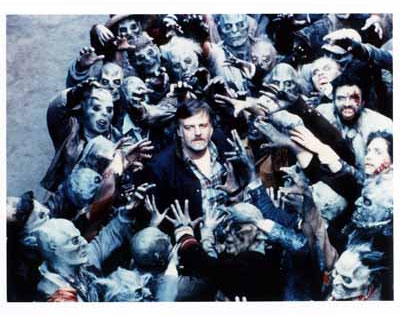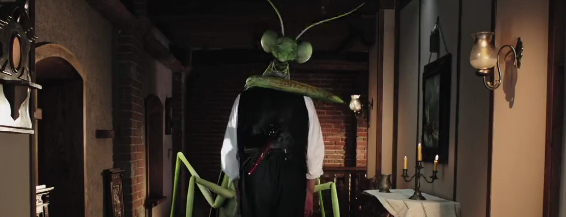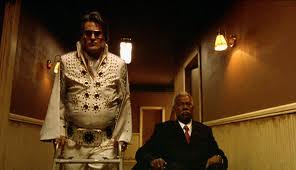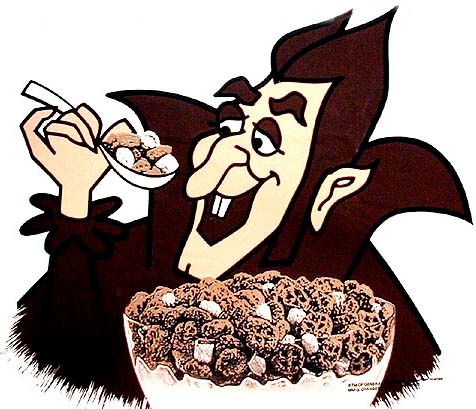 This immediately felt like yet another of my rants that demanded a flurry of apologies, exemptions and provisos to preface it. I do use the term ‘fan’ in a positive sense on a regular basis, often interchangeably with terms like ‘aficionado’ or ‘devotee’. So, for example, if I say an event is run ‘by fans, for fans’, I’m expressing approval, in contrast to more cynical festivals and such where financial profit’s the motivating factor. (It’s an indication of the perceived marketing value of being seen as a fan-focused event that so many film and music events portray themselves as such, when they’re quite clearly purely commercial endeavours.) There is, of course, much to be said for folk who are enthusiastic about and dedicated to the art or entertainment they enjoy, but I think there’s a little more to fandom than that.
This immediately felt like yet another of my rants that demanded a flurry of apologies, exemptions and provisos to preface it. I do use the term ‘fan’ in a positive sense on a regular basis, often interchangeably with terms like ‘aficionado’ or ‘devotee’. So, for example, if I say an event is run ‘by fans, for fans’, I’m expressing approval, in contrast to more cynical festivals and such where financial profit’s the motivating factor. (It’s an indication of the perceived marketing value of being seen as a fan-focused event that so many film and music events portray themselves as such, when they’re quite clearly purely commercial endeavours.) There is, of course, much to be said for folk who are enthusiastic about and dedicated to the art or entertainment they enjoy, but I think there’s a little more to fandom than that.
I think alarm bells first started going off when I first came across fans of my favourite film genre – horror – being described as ‘nerds’ or ‘geeks’. Not, significantly, by a hostile outsider, but a fan, describing themselves and fellow fans as ‘horror geeks’. Now, as these terms were principally coined as anti-intellectual slurs by boneheaded sports fans and cowardly conformists, I certainly don’t want to come out and say there’s anything wrong with being a nerd, or indeed a geek. Equally, however, I’m not convinced it’s something to aspire to. The advent of ‘geek chic’, with dickheads wearing horn-rimmed glasses with non-prescription lenses – or even no fucking lenses at all – in order to follow fashion, is surely enough on its own to make avoiding geekdom like the plague a sensible decision. Yet I’d like to think I’m driven by a little more than rabid inverse snobbery.

Geeks have been traditionally associated with science fiction and comic books. More specifically, they’ve been associated with focusing obsessively on specific franchises – archetypally Star Trek – to the fixated degree where they’ve not just bought the T-shirt, but learnt the imaginary language. I remain sceptical that everyone who declared their religion as ‘Jedi’ on the census was joking. This is ‘fan’ as an abbreviation of ‘fanatic’ – as in monomaniacal devotion – and I suspect it’s not something we should be encouraging. Certainly, regardless of whether it’s become chic or not, I’d rather not see this happen in horror, which is generally commendably broadminded. Attend a good horror movie festival, and you’ll see everything from harrowingly gritty realist drama to zany comic fantasies, appreciated by audiences open to anything dark or offbeat that stirs the imagination or gets the blood pumping effectively. Of course, I’m probably biased as a lifelong horror fan.
There’s that word again. It is of course probably impossible to successfully separate and eliminate a word so successfully ingrained in our collective consciousness as a ‘good thing’. But perhaps you’ll humour me for the next few hundred words while I at least give it my quixotic best. Much of my problem with fans is their fanatical, undiscriminating nature. (The fact that ‘discrimination’ – the ability to differentiate one thing from another based upon quality – has become an almost exclusively negative term reflects something depressing about the modern world, but something beyond the remit of this little rant…) You might suggest that folk being fans – becoming uncritically obsessed with something or someone – is not only none of my business, but does no harm. You’ll doubtless be unsurprised to learn that I beg to differ…
 The first thing is that a world which favours fans is one which habitually promotes shit. The faceless suits that pull the strings behind the scenes love fans, because nothing pleases them more than gullible, compulsive consumers. The sort of idiot who’ll buy four new ‘official’ football strips a year, every year, at vastly inflated prices without a qualm. If the suits can create similar scenarios in the realms of music and film, you can bet they’ll do it in a heartbeat. This is why certain undemanding rubbish receives enormous amounts of promotional resources – why we get fuckawful awards like the Grammies and the Brits – while other more interesting material is left to fend for itself in this hostile environment. It isn’t to do with promoting commercial material – if it’s truly that commercial, why bother? – but hyping shit that’s cheap and easy to churn out. I have some ideas on distinguishing such McMusic from the real deal – my binary theory of musical appreciation – but I’ll leave that for another time…
The first thing is that a world which favours fans is one which habitually promotes shit. The faceless suits that pull the strings behind the scenes love fans, because nothing pleases them more than gullible, compulsive consumers. The sort of idiot who’ll buy four new ‘official’ football strips a year, every year, at vastly inflated prices without a qualm. If the suits can create similar scenarios in the realms of music and film, you can bet they’ll do it in a heartbeat. This is why certain undemanding rubbish receives enormous amounts of promotional resources – why we get fuckawful awards like the Grammies and the Brits – while other more interesting material is left to fend for itself in this hostile environment. It isn’t to do with promoting commercial material – if it’s truly that commercial, why bother? – but hyping shit that’s cheap and easy to churn out. I have some ideas on distinguishing such McMusic from the real deal – my binary theory of musical appreciation – but I’ll leave that for another time…
For now, suffice to say, becoming a fan invites becoming part of this process, a passive observer – or even an active cog – in the creative abattoir currently consuming the entertainment biz. But, you might argue – to move our focus back to movies – the film franchise you obsess over is far more sophisticated and original than the kind of populist pap I’ve been describing. It might well be, or at least was. The Hollywood machine does of course throw up something innovative or clever, be it by accident or design. It may very well be that the first film in your franchise qualified, but by the time it’s become fan fodder the tendency for it to become bland and predictable is building exponentially. More importantly, perhaps, the chances are when the first film came out, it did so unheralded by critics and unloved by fans. It was those adventurous cinemagoers willing to take a chance on a promising unknown quantity, not fans obsessed with a pop culture monolith, that kept your treasured fan favourite alive in the first place. If you want to stay faithful to the spirit of your favourite flick, spend money on speculative film tickets, not yet more branded merchandise. Debate the merits of oddball indie releases, not the minutiae of the continuity in tired sequels.

At least as a fan, you’re showing support for your favourite artists, and that has to be a good thing, right? Maybe, maybe not…. I most certainly appreciate it when somebody tells me that they like my work. But there again, believe it or not, that doesn’t happen so often. Even when it does, it can be kind of awkward. What do you say? If you agree you sound like an arrogant dick. Disagree and you come across as a grumpy old sod. Being English, of course, I have the third option of apologising, which I often use, before flailing around for some self-deprecating anecdote that illustrates that, while I may look like an international playboy and dashing man of letters, at heart I am still basically mortal. However, back in what passes for the real world, as a consequence of my work, I have had recourse to rub shoulders with sundry folk who really are famous. One major impression I’ve come away with is that, while admitting it would finish their careers, many of them are decidedly ambivalent about fans in private. Allow me to elaborate…
While it certainly suits some celebrities to be, well, publicly celebrated, others struggle to conceal their discomfit or even disgust. In my experience, the dividing line is ego versus talent. Those with plentiful self-belief but little actual ability bask in fan adoration, while those who are authentically gifted shrink from it. I’ve been sat next to someone as successions of fans have approached our table, proffering drinks, flirting, while struggling to know what to say. What if you, as a breathless fan, say the wrong thing to your lifelong idol? From the other end, while you have to be polite and tolerant, even grateful, the overwhelming feeling is awkwardness – the first-date-style awkwardness of struggling not to give the wrong impression to someone you don’t really know by saying something wrong. Of course, for some celebrities this is an ideal opportunity – a one-night-stand scenario (often in a quite literal sense) – where it doesn’t matter what they say because the other person doesn’t matter and you’ll never see them again. But these are seldom the kind of stars who have much to say worth hearing – either in person or with their work – and casting yourself at their feet is likely just feeding an already clinically obese ego. So, on balance, you should of course show appreciation for the work of someone you admire, but act like a fan and only the arseholes will appreciate that.

But, of course, there are less high profile legends that attract their own legions of fans – the backroom boys that garner more intellectual adulation without necessarily drawing mobs wanting to stick their tongues down their throats. Surely this kind of less carnal, cerebral celebrity worship can’t do any harm? I’d argue that even here undue adulation can be unhelpfully dazzling, even paralysing, doing untold damage to a talented artist’s career. Perhaps I can illustrate by referring to the realms of film fandom, specifically the horror genre, an area I know pretty well. Let’s take a couple of genre giants that towered over horror cinema during my formative years. To be honest, I never understood the widespread worship of Dario Argento. Some of his cinema – most notably Suspiria – was inspirational. But so much of his best work was undone by silly plots, dire dialogue and dodgy acting – why did nobody mention this to Dario? Whatever happened to George Romero? Turned one of America’s most visionary and daring directors into a sorry Hollywood hack, turning out dross that looks like clumsy film school pastiches of classic Romero?

I’d say the fans happened. So fans are responsible for kitschy dreck like Dracula 3D or the maladroit disaster that was Diary of the Dead? I’d say pretty much, yes. Being surrounded by dedicated cineastes hailing your genius to the heavens must have an impact on your sense of perspective if nothing else. While Argento should have been focusing on improving those aspects of his craft that let his work down, he was being distracted by too many voices lionising elements of his movies Dario didn’t even realise were in there. When George finally returned to the cinema of the living dead, he’d read so many pretentious articles dissecting his classics as works of profound social criticism, he forgot that they began as just cool ideas for scary flicks. For different reasons, two brilliant filmmakers lost their mojo, though in both cases I’d say it was the undiscriminating adulation of fans that played a leading role, making Argento over-complacent and Romero over-self-conscious.

By way of control, I’d offer Don Coscarelli, a horror director who emerged from the same period. Coscarelli was best known for his Phantasm franchise, beginning in 1979, and currently at number IV in the series as of 1998. Phantasm certainly has its fans – three sequels prove that – but it’s never enjoyed the fanatical following of Argento’s ‘Mother’ films, or Romero’s ‘Dead’ series, which have delivered such crushing disappointments to fans over the past decade. Similarly, Coscarelli’s seldom enjoyed the auteur tag routinely applied to Argento and Romero. In the case of cult Italian directors like Argento, narrative incoherence is typically interpreted as deliberate artistry designed to achieve a surreal, nightmarish effect rather than evidence of directorial shortcomings. Similar bizarre plot insanity in the Phantasm films often wasn’t cut so much slack. Yet, while Dario’s been depressing fans with Giallo and George discouraging devotees with Survival of the Dead, Don’s been blowing audiences away with truly original, breathtakingly good films like Bubba-Ho-Tep and John Dies at the End. Evidence that the absence of an overweening fan base can leave you to concentrate on the business of making cool movies mayhaps?…
 As I write this, I am increasingly aware that the familiar face of hypocrisy looms over proceedings, not least in the shape of a signed Vincent Price picture that presides over my study. Similar evidence that I myself am not immune to the fan syndrome can be found all over the house, from the Universal Monsters busts that guard my DVD collection, to the Hammer horror coffee mugs in the kitchen. Much of my fan ephemera relates to older, classic genre outings – though I still buy it to this day – suggestive perhaps that fan worship is perhaps somewhat age-related. Somebody once said something along the lines that nobody ever sees their favourite film after the age of twenty, and I think there’s some truth in that. There’s something about encountering films with the wide-eyed enthusiasm of an adolescent that’s impossible to recapture as we grow older, and as our powers of discrimination wax, our passion wanes.
As I write this, I am increasingly aware that the familiar face of hypocrisy looms over proceedings, not least in the shape of a signed Vincent Price picture that presides over my study. Similar evidence that I myself am not immune to the fan syndrome can be found all over the house, from the Universal Monsters busts that guard my DVD collection, to the Hammer horror coffee mugs in the kitchen. Much of my fan ephemera relates to older, classic genre outings – though I still buy it to this day – suggestive perhaps that fan worship is perhaps somewhat age-related. Somebody once said something along the lines that nobody ever sees their favourite film after the age of twenty, and I think there’s some truth in that. There’s something about encountering films with the wide-eyed enthusiasm of an adolescent that’s impossible to recapture as we grow older, and as our powers of discrimination wax, our passion wanes.
Perhaps that’s the essence of the issue. I get irritated when certain words are habitually used as pejorative terms – such as ‘middle class’ or ‘adolescent’ – as this is lazy thinking, prejudice that focuses on the negative stereotypes while ignoring the positives. I also have little time for those Jeremiads who insist they don’t make any good films/music/whatever anymore. You just can’t be bothered to look anymore. So, if fan status implies the passion and open-mindedness of youth, it’s a positive thing. It’s just when we cling onto it long after puberty was a distant memory that it has a habit of going stale or even turning toxic. You can’t hold onto the magical feelings you experienced when you first encountered your favourite work of art, and trying to do so will just ruin your appreciation of future works. So, as we mature from Monster Kids, let’s not aspire to be horror geeks, but become genre aficionados and enthusiasts. Now, I’m off to enjoy a bowl of Count Chocula…

